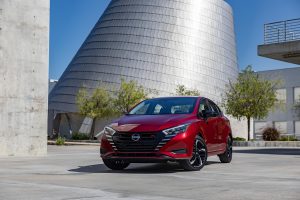Expect to spend nearly $2,000 more for your next vehicle due to the Trump administration’s tariffs on imported autos and auto parts, automakers expected to pass on most of the $30 billion in higher costs they’ll face, according to a new study, But that could result in 1 million fewer sales this year, while some foreign-made vehicles will likely vanish from U.S. showrooms because they’ll be priced out of reach, reports Headlight.News.

Pres. Donald Trump’s tariffs are expected to add thousands of dollars to the price of a typical vehicle.
U.S. new vehicle prices will rise by nearly $2,000 in the months ahead, according to a new study, those higher costs likely to reduce new vehicle sales by as much as 1 million over the next three years.
Though the Trump administration has yet to finalize all the rules on its new tariffs covering imported autos and auto parts, manufacturers will face $30 billion in additional costs, the bulk of which they’re expected to pass onto consumers, the report by AlixPartners anticipates.
Some models, primarily imports, will vanish from showrooms because they’ll be priced out of reach, AlixPartners analysts cautioned.
“A big wall”

European brands, especially high-line exotics like Lamborghini, could be particularly hard hit by tariffs.
The precise impact of the new Trump tariffs may not become clear for some time, the study said, as final details have yet to be worked out – and automakers are still working on strategies to reduce the impact. In some cases they may move production of some foreign-made models to the U.S., or shift from overseas suppliers to ones based domestically.
As things stand, however, the industry is likely going to have to pay out about $30 billion in tariffs annually, the new study estimates, with automakers likely to pass 80% of that onto buyers.
“Consumers (will be) taking the majority of the hit,” Mark Wakefield, the head of AlixPartners’ auto practice said during an online briefing with reporters. That adds up to “a big wall of cost,” at least $1,760 for every new vehicle.
Some products could vanish
“The tariffs have changed a lot over the last 60 days,” David Steinert, a partner in the auto practice, noted during a follow-up conversation with Headlight.News. And they’ll likely continue to change as the Trump administration works up new trade agreements, as it already has done with the UK.
Ultimately, the tariffs could vary widely by manufacturer. The study anticipates tariffs will remain particularly high on goods from China. Steinert also sees European manufacturers facing more tariff costs than Japanese brands because companies like Toyota and Honda now operate a large network of U.S. assembly plants.
Even so, all automakers will feel the brunt in one form or another and they’ll have to come up with new strategies to minimize the impact. In some cases that might lead them to abandon products that would be priced beyond what customers are willing to spend. Nissan recently announced it will stop selling Versa in the U.S., blaming tariff costs.
Steinert said he expects the industry will try to absorb tariff costs for entry-level products to avoid driving budget buyers out of the market. On the other hand, with “some of the higher-end brands, with customers who are less price-sensitive, you’ll see more of the tariffs passed through.”
That said, Steinert cautioned that manufacturers will be less likely to offer the big incentives buyers could anticipate in years past, whatever the product, as they struggle to deal with higher costs of their own.
More Tariff News
- Budget Buyers Likely to be Hard Hit by Tariffs
- Trump Gives Some Tariff Relief to Automakers]
- Automakers Find Ways to Offset Tariffs
EVs likely to take the hardest hit
Battery-electric vehicles could face a triple whammy, the study warns:
- Import models, such as the Audi Q4 e-tron, Mercedes-Benz EQE sedan and Hyundai Ioniq 6 currently face 25% tariffs;
- Even domestically assembled EVs, like the Ford Mach-E and Chevrolet Silverado EV, rely heavily on imported parts and components;
- And most EVs depend on Chinese suppliers for either their batteries or many of the raw materials in their battery packs.
The Trump administration has also indicated plans to end the federal tax credits of up to $7,500 that have helped build EV demand. Without those incentives, said Wakefield, many potential customers will “follow their pocketbook” and stick with vehicles running on gas or diesel.
While AlixPartners previously forecast EVs would account for 31% of U.S. sales by 2030, the new study cuts that to 17%.
Sales likely to drop
But there’s widespread expectation that new vehicle sales, on the whole, will take a big hit due to rising prices. A study released in May by Cox Automotive estimated demand for all of 2025 could drop to around 15 million, about 1 million less than last year. And that could drop to 14 million should the tariffs trigger a recession, as some economists fear.
For its part, AlixPartners is a bit more bullish. It anticipates manufacturers will only lose about 1 million sales over the next three years – at least if White House negotiators can pull together the deals Pres. Donald Trump has promised. On average, the new study expects auto tariffs to eventually drop to an average 7.5% from the 25% figure that went into effect May 3.
“The tariff wall is not likely to last forever,” Wakefield forecast. By 2030, he anticipates U.S. new vehicle demand will rebound to around 17 million. The industry reached a record 17.1 million back in 2016.








0 Comments